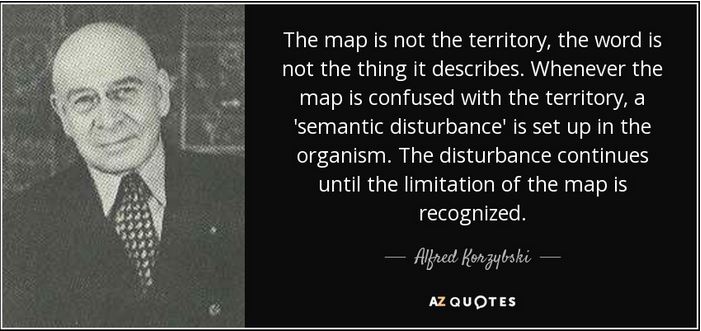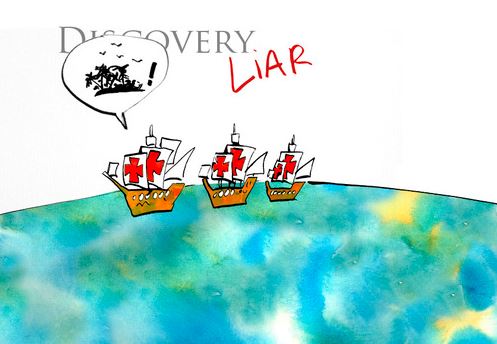Map And Territory
We Confuse The Map With The Territory
When map and terrain differ, follow the terrain

Map And Territory - Overview
We confuse map and territory.
There are two types of map:
- External maps - which may be digital or physical hard copy, and these are representations of the landscape they describe which may be topographical or situational.
- Internal maps - that you create that form your concepts of reality, your inner sense of time, place and situation, and of self-image.
In both cases these maps are abstractions of reality and they can include descriptions, theories, and models.
All maps are imperfect:
- They are reductions of what they represent.
- A map is a snapshot of a landscape [either topographical or situational] at a point in time.
- A map represents something that no longer exists.
This is important to keep in mind as you think through problems and make decisions.
The problems arise when you confuse map and territory.
In other words, your perception of the world could be different from the real world.
While it might sound too obvious, a surprisingly large number of people tend to confuse their beliefs with reality.
The map and territory concept was developed by noted mathematician Alfred Korzybski to explain the fact that belief is different from reality, and he coined the popular phrase: "The map is not the territory."
When Korzybski talks [in the quote in the graphic at the top of this article] about a "semantic disturbance" being set up, what he is talking about is the limitations of language.
These limitations cause the loss of meaning to become exacerbated as the words we use to describe something are always heard or read within a language, a context and a framing.
Getting Stuck With The Map and Territory

We create abstractions, concepts, beliefs and maps to try to make sense of the complex world we live in.
In Conscious Thinking we noted that:
"Human intelligence has a serious limitation. It is a scanning system of conscious attention, and that scanning system is linear—it examines the world in lines, as you would pass a flashlight beam across a darkened room, focusing on one thing at a time, sequentially.
But the real world doesn’t happen one thing at a time, one thing after another. The real world is multidimensional, with a lot happening all at once, and it comes at us so fast and all at once in such a way that we could never scan it in the narrow focused linear way humans typically think"
What you may not so aware of is how your unconscious internal filtering mechanism shapes and creates your internal representations of the landscapes we experience and observe.
All of this can cause you to get stuck in your beliefs and perceptions of the world and blind you to seeing the world for what it is.
Two or more people can observe the same event and offer very different versions of the same event.
So it is important to understand that your abstractions and perceptions are at the very best a hazy approximation of the real world.
If you believe 100% in your own version of the event and convince yourself that it is what happened, you could be entirely wrong.
In conclusion:
- The map does not change the territory at any time.
- Just because you
erase a portion of a territory on a map, it does not disappear in the
real world.
- When your beliefs and perceptions about the world change, the world does not change, it is what it is, even though your understanding of it has changed.
- A map - or a model - can only be helpful if you understand its limitations.
Resources:
Excellent and comprehensive article from Shane Parrish of Farnam St: The Map Is Not The Territory
Return from "Map and Territory" to: Mental Models
LATEST ARTICLES
The Inner Weight of Shame - Sustained By Attentional Fixation
 A Mind That Is Continuously Engaged In Self-Surveillance. Shame is one of the heaviest inner burdens a human being can carry. It does not announce itself loudly or demand attention through drama. Inst…
A Mind That Is Continuously Engaged In Self-Surveillance. Shame is one of the heaviest inner burdens a human being can carry. It does not announce itself loudly or demand attention through drama. Inst…Does Prayer Work? The Psychology of Prayer, Meditation and Outcomes
 Reality Is A Complex System Of Countless Interactions - Including Yours. So does prayer work? The problem is that the question itself is usually framed in a way that guarantees confusion. We tend to a…
Reality Is A Complex System Of Countless Interactions - Including Yours. So does prayer work? The problem is that the question itself is usually framed in a way that guarantees confusion. We tend to a…Living in Survival Mode Without Surrendering Mental Authority
Living in Survival Mode Without Surrendering Mental Authority
 Clear Thinking When You’re Just Trying to Stay Afloat. Many people today are overwhelmed because they are living in survival mode - not temporarily, but as a persistent condition of life. For many, th…
Clear Thinking When You’re Just Trying to Stay Afloat. Many people today are overwhelmed because they are living in survival mode - not temporarily, but as a persistent condition of life. For many, th…Manifestation Without Magic: A Practical Model
 Manifestation without magic is not a softer or more intellectual version of popular manifestation culture. It is a different model altogether. Popular manifestation teachings tend to frame reality as…
Manifestation without magic is not a softer or more intellectual version of popular manifestation culture. It is a different model altogether. Popular manifestation teachings tend to frame reality as…Staying Committed When You Can't See Progress - The Psychology of Grit
 Uncertainty Is Not The Absence Of Progress, Only The Absence Of Reassurance. One of the most destabilising experiences in modern life is not failure, but uncertainty and staying committed when you can…
Uncertainty Is Not The Absence Of Progress, Only The Absence Of Reassurance. One of the most destabilising experiences in modern life is not failure, but uncertainty and staying committed when you can…The Battle For Your Mind - How To Win Inner Freedom In A Digital Age Of Distraction
 From External Events to Inner Events. We often think of “events” as things that happen out there: the traffic jam, the rude comment, the delayed email reply. But what truly shapes our experience is wh…
From External Events to Inner Events. We often think of “events” as things that happen out there: the traffic jam, the rude comment, the delayed email reply. But what truly shapes our experience is wh…How to See Your Thoughts Without Becoming the Story
 A Practical Guide to Thought-Awareness. You can spend your life inside the stories of your mind without ever learning how to see your thoughts clearly and objectively. Most of the stuff we tell oursel…
A Practical Guide to Thought-Awareness. You can spend your life inside the stories of your mind without ever learning how to see your thoughts clearly and objectively. Most of the stuff we tell oursel…The Collison Decision Matrix - A Simple Framework for Better Choices
 The Collison Decision Matrix Is A Practical Everyday Thinking Tool. Most of us spend a surprising amount of time worrying about decisions. From small ones such as what to wear, what to eat, what to te…
The Collison Decision Matrix Is A Practical Everyday Thinking Tool. Most of us spend a surprising amount of time worrying about decisions. From small ones such as what to wear, what to eat, what to te…The Power Of Asking The Right Question
 The Power Of Asking The Right Question Lies In The Quest For Insight. To experience the power of asking the right question you must develop the practice of asking questions. The best way to improve th…
The Power Of Asking The Right Question Lies In The Quest For Insight. To experience the power of asking the right question you must develop the practice of asking questions. The best way to improve th…Site Pathways
 Here is a site pathway to help new readers of Zen-Tools navigate the material on this site. Each pathway is based around one of the many key themes covered on this site and contain a 150 word introduc…
Here is a site pathway to help new readers of Zen-Tools navigate the material on this site. Each pathway is based around one of the many key themes covered on this site and contain a 150 word introduc…How To Live With Contradiction - Beyond Thought Let Stillness Speak
 A major impact on so many peoples' lives is the situational contradiction of unfilled realistic expectations. So where does all this leave us? Well here we are, with mental equipment that is more lim…
A major impact on so many peoples' lives is the situational contradiction of unfilled realistic expectations. So where does all this leave us? Well here we are, with mental equipment that is more lim…